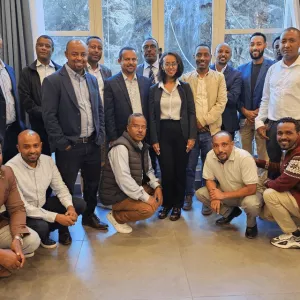De-risking crop commodity from climate induced risks across Agricultural Commercialization Clusters (ACCs) in Ethiopia
This initiative aims to increase farmers’ income, facilitate market opportunities, enhance agro-processing services, increase the volume of products, and create more jobs. Ethiopia, heavily reliant on rain-fed agriculture, faces significant risks from climate hazards. Recognizing this, Alliance of Bioversity International and International Center for Tropical Agriculture (CIAT) and Agricultural Transformation Institute (ATI) organized a consultative workshop on “De-risking crop commodity

De-risking crop commodity from climate induced risks across Agricultural Commercialization Clusters (ACCs) in Ethiopia
This initiative aims to increase farmers’ income, facilitate market opportunities, enhance agro-processing services, increase the volume of products, and create more jobs. Ethiopia, heavily reliant on rain-fed agriculture, faces significant risks from climate hazards. Recognizing this, Alliance of Bioversity International and International Center for Tropical Agriculture (CIAT) and Agricultural Transformation Institute (ATI) organized a consultative workshop on “De-risking crop commodity from climate induced risks across Agricultural Commercialization Clusters (ACCs)” on 26 December 2023 in Addis Ababa.
The initiative is supported by the CGIAR Initiative on “Ukama Ustawi (UU): Diversification for Resilient Agrifood Systems in East and Southern Africa (ESA)”, which aims to address food and nutrition security risks in the region arising from an overreliance on maize through a climate-resilient, water-secure, and socially inclusive approach.
The aim of the workshop was to discuss preliminary research results on climate risks across ACC and brainstorm ideas for future work. The workshop brought together over twenty decision makers, researchers, practitioners, and implementers from over six governmental and non-governmental organizations.
The following presentations were made and discussed at the workshop:
An overview of the CGIAR Initiative on “Diversification in East and Southern Africa, also known as Ukama Ustawi” by Sintayehu Alemayehu, the project team leader and senior scientist, Alliance of Bioversity International and International Center for Tropical Agriculture (CIAT);
Preliminary research results on “Baseline Climate Risks across ACCs” by Tadesse Terefe Climate Change Research Project Coordinator, Climate Action, Alliance of Bioversity International and International Center for Tropical Agriculture (CIAT);
Integrating Climate Risk Management Across ACC by Sintayehu Workeneh Research Project Coordinator, Climate Action, Alliance of Bioversity International and International Center for Tropical Agriculture (CIAT)
The takeaway messages:
Addressing climate induced challenges requires a comprehensive and holistic approach. Efforts should prioritize boosting food security through mainstreaming of climate-resilient agriculture across ACC. The event received positive feedback from participants, including researchers, policymakers, and representatives from various organizations working towards climate change resilience in Ethiopia. The workshop served as a platform to disseminate important preliminary research findings and foster dialogue among stakeholders, enhance collaboration, exchange ideas, suggestions, and recommendations to contribute to the ongoing efforts in building resilience to climate change in Ethiopia. The workshop also identifies entry points and chart out practical pathways to incorporate climate-resilient agriculture across ACC.

